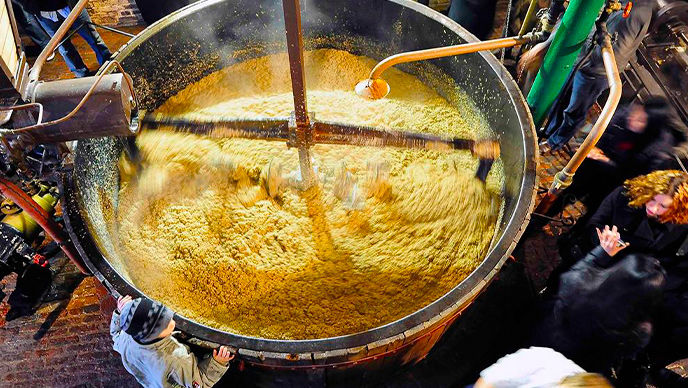

Great beer balances bitterness, color, flavor and body. As an all-grain brewer, you need understand how to control the body of your home brewed beer using mash temperature. By altering your mash schedule to match the style of beer you are brewing you can achieve precise control over the body and mouth-feel of your beer.
Managing Beer Body in the Mash
The key step in mashing is called the conversion step. Frequently done at a temperature between 146F/63C and 156F/69C, the conversion step breaks down complex sugars in the grains into shorter chains of sugar that can be consumed by yeast. If you are doing a single step infusion mash, the conversion step is your single step.
The temperature of your conversion step determines, in large part, what percentage of the complex sugars are broken down into simpler sugars. This is due to the enzymes active in the mash that break down complex sugars into simpler ones.
The two main enzymes active during the mash are alpha and beta amylase. Alpha amylase, which is most active in the 154-167F/68-75C range, creates longer sugar chains that are less fermentable, resulting in a beer with more body. Beta amylase, which is most active between 130-150F/54-65 C trims off single maltose sugar units that are more fermentable. This results in a more complete fermentation (higher attenuation) and a cleaner beer with a thinner body.
A more complete explanation is as follows: both enzymes work to break longer sugar chains into smaller maltose units that yeast can ferment. Alpha amylase is very flexible as it can break sugars chains up at almost any point, and is useful for creating shorter chains for beta amylase to work on. Beta amylase, in contrast, breaks off single highly fermentable maltose units of sugar, but can only work from the ends of the sugar chain. As a result beta amylase is better at creating single molecule maltose sugars that yeast loves, but it takes longer as it works only from the ends of the molecule. The two enzymes work best when applied in combination which is why we usually mash in the middle temperature range around 153F/67C.
A low step temperature (146-150F/63-66 C) emphasizing beta amylase will therefore result in a more complete conversion to simple sugars, but will take longer to complete. These simple sugars will ferment more readily, producing a highly attenuated beer that has higher alcohol content but less body and mouth-feel.
Conversely, a high temperature conversion step (154F-156F/68-69 C) emphasizing alpha amylase gives you more unfermentable sugars, resulting in lower alcohol content and a full bodied beer with a lot of mouth-feel. Moderate conversion temperatures (150-153F/65-67C) result in a medium body beer. In BeerSmith the mash profiles are labeled light, medium and full bodied to make this selection easy.
Conversion time also varies with temperature. Complete conversion of your malt for a low temperature, light bodied profile takes longer than a high temperature, full bodied mash profile. For my BeerSmith software, I actually built this into the latest version – using an adjustment factor when estimating the final gravity of the beer based on the mash conversion step temperature.
A Hybrid Mash Conversion Profile
One trick I see some advanced brewers use is to include a step both at a low conversion temperature (say 145F/63 C) and a second mash step at high conversion temperature (say 155F/68 C). This results in very high sugar conversion, and a very clean, light bodied beer. It does this by activating both the alpha and beta amylase in sequence. It is useful primarily for beers that require a clean, dry finish – and is most often associated with lagers.
Designing your Beer
How does this apply to all-grain beer design? It depends upon the style. Some styles, such as lagers have a clean, low bodied finish. Low temperature, light body mash profiles are appropriate to use with these styles. Sweet Stouts, Pale Ales and other full bodied beers will benefit from a full bodied, high temperature mash profile.
Link
http://beersmith.com/blog/2012/12/20/mash-temperature-and-beer-body-in-all-grain-brewing/